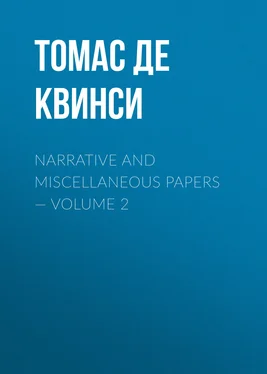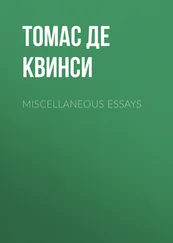Томас Де Квинси - Narrative and Miscellaneous Papers — Volume 2
Здесь есть возможность читать онлайн «Томас Де Квинси - Narrative and Miscellaneous Papers — Volume 2» — ознакомительный отрывок электронной книги совершенно бесплатно, а после прочтения отрывка купить полную версию. В некоторых случаях можно слушать аудио, скачать через торрент в формате fb2 и присутствует краткое содержание. Жанр: foreign_prose, literature_19, foreign_antique, на английском языке. Описание произведения, (предисловие) а так же отзывы посетителей доступны на портале библиотеки ЛибКат.
- Название:Narrative and Miscellaneous Papers — Volume 2
- Автор:
- Жанр:
- Год:неизвестен
- ISBN:нет данных
- Рейтинг книги:3 / 5. Голосов: 1
-
Избранное:Добавить в избранное
- Отзывы:
-
Ваша оценка:
- 60
- 1
- 2
- 3
- 4
- 5
Narrative and Miscellaneous Papers — Volume 2: краткое содержание, описание и аннотация
Предлагаем к чтению аннотацию, описание, краткое содержание или предисловие (зависит от того, что написал сам автор книги «Narrative and Miscellaneous Papers — Volume 2»). Если вы не нашли необходимую информацию о книге — напишите в комментариях, мы постараемся отыскать её.
Narrative and Miscellaneous Papers — Volume 2 — читать онлайн ознакомительный отрывок
Ниже представлен текст книги, разбитый по страницам. Система сохранения места последней прочитанной страницы, позволяет с удобством читать онлайн бесплатно книгу «Narrative and Miscellaneous Papers — Volume 2», без необходимости каждый раз заново искать на чём Вы остановились. Поставьте закладку, и сможете в любой момент перейти на страницу, на которой закончили чтение.
Интервал:
Закладка:
All these cases which we have been rehearsing, taking them in the fullest literality, agree in this general point of union—they are all silent incarnations of miraculous power—miracles, supposing them to have been such originally, locked up and embodied in the regular course of nature, just as we see lineaments of faces and of forms in petrifactions, in variegated marbles, in spars, or in rocky strata, which our fancy interprets as once having been real human existences; but which are now confounded with the substance of a mineral product. Even those who are most superstitious, therefore, look upon cases of this order as occupying a midway station between the physical and the hyperphysical, between the regular course of nature and the providential interruption of that course. The stream of the miraculous is here confluent with the stream of the natural. By such legends the credulous man finds his superstition but little nursed; the incredulous finds his philosophy but little revolted. Both alike will be willing to admit, for instance, that the apparent act of reverential thanksgiving, in certain birds, when drinking, is caused and supported by a physiological arrangement; and yet, perhaps, both alike would bend so far to the legendary faith as to allow a child to believe, and would perceive a pure childlike beauty in believing, that the bird was thus rendering a homage of deep thankfulness to the universal Father, who watches for the safety of sparrows, and sends his rain upon the just and upon the unjust. In short, the faith in this order of the physico- miraculous is open alike to the sceptical and the non-sceptical: it is touched superficially with the coloring of superstition, with its tenderness, its humility, its thankfulness, its awe; but, on the other hand, it is not therefore tainted with the coarseness, with the silliness, with the credulity of superstition. Such a faith reposes upon the universal signs diffused through nature, and blends with the mysterious of natural grandeurs wherever found—with the mysterious of the starry heavens, with the mysterious of music, and with that infinite form of the mysterious for man's dimmest misgivings—
'Whose dwelling is the light of setting suns.'
But, from this earliest note in the ascending scale of superstitious faith, let us pass to a more alarming key. This first, which we have styled (in equity as well as for distinction) the Ovidian , is too ærial, too allegoric, almost to be susceptible of much terror. It is the mere fancy , in a mood half-playful, half-tender, which submits to the belief. It is the feeling, the sentiment, which creates the faith; not the faith which creates the feeling. And thus far we see that modern feeling and Christian feeling has been to the full as operative as any that is peculiar to paganism; judging by the Romish Legenda , very much more so. The Ovidian illustrations, under a false superstition, are entitled to give the designation, as being the first, the earliest, but not at all as the richest. Besides that, Ovid's illustrations emanated often from himself individually, not from the popular mind of his country; ours of the same classification uniformly repose on large popular traditions from the whole of Christian antiquity. These again are agencies of the supernatural which can never have a private or personal application; they belong to all mankind and to all generations. But the next in order are more solemn; they become terrific by becoming personal. These comprehend all that vast body of the marvellous which is expressed by the word Ominous . On this head, as dividing itself into the ancient and modern, we will speak next.
Everybody is aware of the deep emphasis which the Pagans laid upon words and upon names, under this aspect of the ominous. The name of several places was formally changed by the Roman government, solely with a view to that contagion of evil which was thought to lurk in the syllables, if taken significantly. Thus, the town of Maleventum, (Ill- come, as one might render it,) had its name changed by the Romans to Beneventum, (or Welcome.) Epidamnum again, the Grecian Calais, corresponding to the Roman Dover of Brundusium, was a name that would have startled the stoutest-hearted Roman 'from his propriety.' Had he suffered this name to escape him inadvertently, his spirits would have forsaken him—he would have pined away under a certainty of misfortune, like a poor Negro of Koromantyn who is the victim of Obi.[Footnote: ' The victim of Obi. '—It seems worthy of notice, that this magical fascination is generally called Obi, and the magicians Obeah men, throughout Guinea, Negroland, &c.; whilst the Hebrew or Syriac word for the rites of necromancy, was Ob or Obh , at least when ventriloquism was concerned.] As a Greek word, which it was, the name imported no ill; but for a Roman to say Ibo Epidamnum , was in effect saying, though in a hybrid dialect, half-Greek half-Roman, 'I will go to ruin.' The name was therefore changed to Dyrrachium; a substitution which quieted more anxieties in Roman hearts than the erection of a light-house or the deepening of the harbor mouth. A case equally strong, to take one out of many hundreds that have come down to us, is reported by Livy. There was an officer in a Roman legion, at some period of the Republic, who bore the name either of Atrius Umber or Umbrius Ater: and this man being ordered on some expedition, the soldiers refused to follow him. They did right. We remember that Mr. Coleridge used facetiously to call the well-known sister of Dr. Aikin, Mrs. Barbauld, 'that pleonasm of nakedness'—the idea of nakedness being reduplicated and reverberated in the bare and the bald . This Atrius Umber might be called 'that pleonasm of darkness;' and one might say to him, in the words of Othello, 'What needs this iteration?' To serve under the Gloomy was enough to darken the spirit of hope; but to serve under the Black Gloomy was really rushing upon destruction. Yet it will be alleged that Captain Death was a most favorite and heroic leader in the English navy; and that in our own times, Admiral Coffin, though an American by birth, has not been unpopular in the same service. This is true: and all that can be said is, that these names were two-edged swords, which might be made to tell against the enemy as well as against friends. And possibly the Roman centurion might have turned his name to the same account, had he possessed the great Dictator's presence of mind; for he, when landing in Africa, having happened to stumble—an omen of the worst character, in Roman estimation—took out its sting by following up his own oversight, as if it had been intentional, falling to the ground, kissing it, and ejaculating that in this way he appropriated the soil.
Omens of every class were certainly regarded, in ancient Rome, with a reverence that can hardly be surpassed. But yet, with respect to these omens derived from names, it is certain that our modern times have more memorable examples on record. Out of a large number which occur to us, we will cite two:—The present King of the French bore in his boyish days a title which he would not have borne, but for an omen of bad augury attached to his proper title. He was called the Duc de Chartres before the Revolution, whereas his proper title was Duc de Valois. And the origin of the change was this:—The Regent's father had been the sole brother of Louis Quatorze. He married for his first wife our English princess Henrietta, the sister of Charles II., (and through her daughter, by the way, it is that the house of Savoy, i.e. of Sardinia, has pretensions to the English throne.) This unhappy lady, it is too well established, was poisoned. Voltaire, amongst many others, has affected to doubt the fact; for which in his time there might be some excuse. But since then better evidences have placed the matter beyond all question. We now know both the fact, and the how, and the why. The Duke, who probably was no party to the murder of his young wife, though otherwise on bad terms with her, married for his second wife a coarse German princess, homely in every sense, and a singular contrast to the elegant creature whom he had lost. She was a daughter of the Bavarian Elector; ill-tempered by her own confession, self- willed, and a plain speaker to excess; but otherwise a woman of honest German principles. Unhappy she was through a long life; unhappy through the monotony as well as the malicious intrigues of the French court; and so much so, that she did her best (though without effect) to prevent her Bavarian niece from becoming dauphiness. She acquits her husband, however, in the memoirs which she left behind, of any intentional share in her unhappiness; she describes him constantly as a well-disposed prince. But whether it were, that often walking in the dusk through the numerous apartments of that vast mansion which her husband had so much enlarged, naturally she turned her thoughts to the injured lady who had presided there before herself; or whether it arose from the inevitable gloom which broods continually over mighty palaces, so much is known for certain, that one evening, in the twilight, she met, at a remote quarter of the reception-rooms, something that she conceived to be a spectre. What she fancied to have passed on that occasion, was never known except to her nearest friends; and if she made any explanations in her memoirs, the editor has thought fit to suppress them. She mentions only, that in consequence of some ominous circumstances relating to the title of Valois , which was the proper second title of the Orleans family, her son, the Regent, had assumed in his boyhood that of Duc de Chartres. His elder brother was dead, so that the superior title was open to him; but, in consequence of those mysterious omens, whatever they might be, which occasioned much whispering at the time, the great title of Valois was laid aside for ever as of bad augury; nor has it ever been resumed through a century and a half that have followed that mysterious warning; nor will it be resumed unless the numerous children of the present Orleans branch should find themselves distressed for ancient titles; which is not likely, since they enjoy the honors of the elder house, and are now the children of France in a technical sense.
Читать дальшеИнтервал:
Закладка:
Похожие книги на «Narrative and Miscellaneous Papers — Volume 2»
Представляем Вашему вниманию похожие книги на «Narrative and Miscellaneous Papers — Volume 2» списком для выбора. Мы отобрали схожую по названию и смыслу литературу в надежде предоставить читателям больше вариантов отыскать новые, интересные, ещё непрочитанные произведения.
Обсуждение, отзывы о книге «Narrative and Miscellaneous Papers — Volume 2» и просто собственные мнения читателей. Оставьте ваши комментарии, напишите, что Вы думаете о произведении, его смысле или главных героях. Укажите что конкретно понравилось, а что нет, и почему Вы так считаете.












